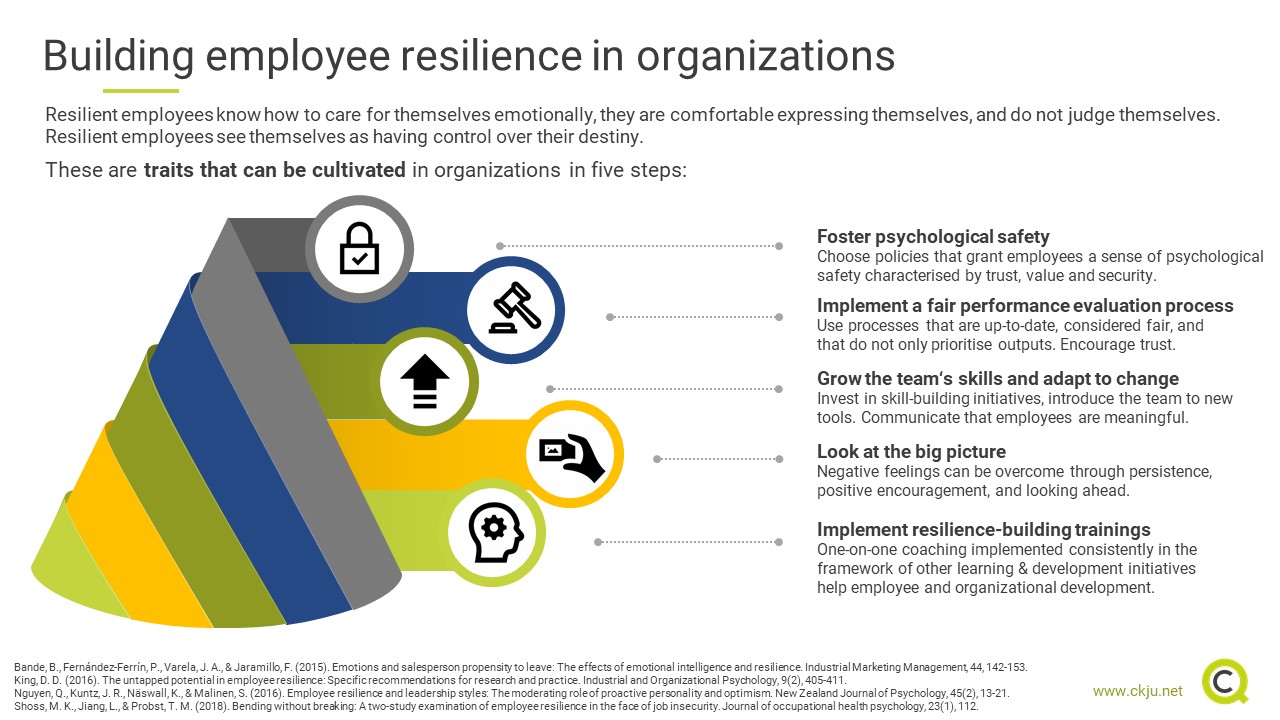- Blog
- Building employee resilience
Contents
What is resilience?
Resilience is not synonymous with bravery, strength, or emotional coldness. A resilient person can feel disappoint, sadness, or fear quite deeply, in fact. What differentiates a resilient person from a less resilient person is their behavior (Aburn, Gott, & Hoare, 2016) – how long does it take them to recover from an upset? What behaviors do they engage in self-soothe when something upsetting or disappointing has happened? How do they explain their own failure or success?
Resilient employees know how to care for themselves emotionally. They realize when they need to take a break or step back, and when they are ready to hit the ground running (Mosteo et al, 2016). A resilient employee is comfortable expressing sadness or frustration, and does not judge themselves for having those feelings. By accepting and processing negative emotions, they are able to keep taking action. Finally, a resilient employee sees themselves as having a great deal of control over their destiny (Bande et al, 2015). They have hope, therefore, that future attempts will lead to better results. These are the traits that you, as a manager, should seek to cultivate.
Management skills newsletter
Join our monthly newsletter to receive management tips, tricks and insights directly into your inbox!
Foster psychological safety to help the interaction between management and employees.
The ways in which a manager interacts with their employees can have a significant effect on how resilient employees feel. It is beneficial, for example, to choose policies that grant employees a sense of psychological safety. Psychologically safe employees feel trusted and valued by their employer, and feel secure in their jobs. When an employee does not feel as though a firing is forever looming, they are more likely to “bounce back” in the face of disappointment (Shoss et al, 2018).
Implement a fair performance evaluation process.
Your evaluation processes can also foment resilience in employees. Try not to focus on outcomes that employees do not have direct control over – for example, sales, or productivity that is not directly tied to their own output. Make sure, also, that your evaluation procedures and measures are up-to-date, objective, and viewed by employees as consistent and fair. When employees have trust in the system and how it operates, they are more likely to remain loyal to it, and motivated by it. You can achieve this by introducing an effective performance management system that is linked to your organizations strategy.
Grow your team’s skills and adapt to change.
The workforce is forever changing. New technologies are constantly improving how business is done and causing changes in job responsibilities; while this is exciting to the average business leader, employees can find it immensely threatening. Employees who are afraid of change are not resilient, and their performance tends to suffer over time (Kuntz et al, 2017). In a real sense, such employees may actually become less adaptable and resilient over time – the less relevant their skills are, the less dynamic and productive a worker they can be.
To combat this phenomenon, invest in your employees’ skills. Grant people opportunities to take university classes, enroll in online courses, or attend workshops that will give them new skills. When a new piece of technology disrupts business processes, set aside time to re-train your team and introduce them to new tools (King, 2016). Do not use tools as a form of punishment or threat – the fact that a piece of technology streamlines a task should not be used to put an individual’s job on the line. By taking these steps, you can communicate to your employees that they are meaningful, lasting members of the team, and that they can continue to grow and evolve as their position does.
Look at the big picture and don't let lost in the small details.
Resilient thinkers do not focus on small details. Minor upsets are not dwelled upon, and failures are seen as part of the process of growth. When taking a “big picture” view, it becomes clear that negative feelings will not last forever, and that most frustrations can be overcome through persistence. Managers can help employees to think in this fashion by communicating in big-picture terms, and by orienting the organization toward the future (Nguyen et al, 2016).
When a setback strikes your organization, remind your employees of previous times when such upsets have happened. Emphasize, as you do so, the fact that the organization and its employees rebounded. When an employee makes a mistake, be conscious of the positives they have brought to your team, and the long-term impact of their presence. And when your organization does fail to meet a benchmark, zoom out and look at the long-term progress. Resilient people and organizations are able to keep moving forward by looking ahead. By supporting your employees, investing in them, and remaining optimistic, you can bring productive, valuable resilience to your teams.
Implement resilience-building trainings.
The implementation of a resilience-building training is another management interventions you could consider. A recent meta-analysis conducted by Vanhove et al (2015) sheds some light on how such trainings should be implemented in order to be effective.
- First, resilience building trainings have a small to modest effect. This result might sound disappointing at first glance, but is in line with most other training programs that target at strengthening employee coping skills.
- Second, resilience training programs that are delivered in a one-to-one coaching like fashion are more effective than traditional instructor based classroom trainings.
- Third, Vanhove et al (2015) come to the conclusion that the effect of resilience-building trainings seem to fade out over time. As a consequence, resilience-building training should not be implemented as a onetime intervention, but as part of a broader learning and development program to develop your organization to the next level.
References & further reading
Aburn, G., Gott, M., & Hoare, K. (2016). What is resilience? An integrative review of the empirical literature. Journal of advanced nursing, 72(5), 980-1000.
Bande, B., Fernández-Ferrín, P., Varela, J. A., & Jaramillo, F. (2015). Emotions and salesperson propensity to leave: The effects of emotional intelligence and resilience. Industrial Marketing Management, 44, 142-153.
King, D. D. (2016). The untapped potential in employee resilience: Specific recommendations for research and practice. Industrial and Organizational Psychology, 9(2), 405-411.
Kuntz, J., Connell, P., & Näswall, K. (2017). Workplace resources and employee resilience: the role of regulatory profiles. Career Development International, 22(4), 419-435.
Mosteo, L. P., Batista-Foguet, J. M., Mckeever, J. D., & Serlavós, R. (2016). Understanding cognitive-emotional processing through a coaching process: The influence of coaching on vision, goal-directed energy, and resilience. The Journal of Applied Behavioral Science, 52(1), 64-96.
Nguyen, Q., Kuntz, J. R., Näswall, K., & Malinen, S. (2016). Employee resilience and leadership styles: The moderating role of proactive personality and optimism. New Zealand Journal of Psychology, 45(2), 13-21.
Shoss, M. K., Jiang, L., & Probst, T. M. (2018). Bending without breaking: A two-study examination of employee resilience in the face of job insecurity. Journal of occupational health psychology, 23(1), 112.
Vanhove, A.J., Herian, M.N., Perez, A., Harms, P.D., & Lester, P.B. (2015). Can resilience be developed at work ? A meta-analytic review of resilience-building programme effectiveness.
Top Rated
About the Author

Comments
Most Read Articles
Blog Categories
RELATED SERVICES










Add comment